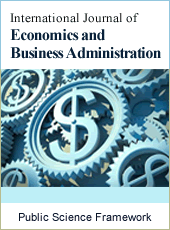International Journal of Economics and Business Administration
Articles Information
International Journal of Economics and Business Administration, Vol.4, No.1, Mar. 2018, Pub. Date: Mar. 24, 2018
Supply Chain Management and Productivity in Nigeria
Pages: 15-20 Views: 2359 Downloads: 592
[01]
John Nkeobuna Nnah Ugoani, College of Management and Social Sciences, Rhema University, Aba, Nigeria.
[02]
Anthony Ugoani, Department of Mechanical Engineering, College of Engineering and Engineering Technology, Federal Polytechnic, Unwana, Nigeria.
Globalization and managing across cultures and borders make the business sense of efficient supply chain management more challenging than ever before. The demand and supply chain can now be as long or as short as the distance between suppliers and consumers who have critical influence on the value chain. This is important because the demand and supply chain processes often have profound effect on productivity levels of the organization. The exploratory research design was deployed for the investigation to gauge the effect of supply chain management on productivity. Through regression analysis it was found that for a 1 percent increase in supply chain management productivity increases by 1.88 percent.
Logistics, Productivity, Value chain, Supply Chain, Network, E-commerce
[01]
Angels, R. (2000). Revisiting the Role of Internet – EDI in the Current Electronic Scene. Logistics Information Management, 13 (1), 45-57.
[02]
Akanwa, P. U and Agu, C. N. (2005) Entrepreneurial Theory and Practice in Nigeria. Owerri, Resources Development Centre.
[03]
Chase, R. B, Aguilano, N. J and Jacobs, F. R. (2001). Operations Management for Competitive Advantage Boston 9th edition, Boston, McGraw-Hill, Irwin.
[04]
Chopra, S. and Meindl, P. (2001) Supply Chain Management Strategy, Planning and Operations Upper Saddle River, J. Prentice Hall.
[05]
Christopher, M. (1992). Logistics and Supply Chain Management London, UK. Putman Publishing.
[06]
Copacino, W. C (1997) Supply Chain Management: The Basics and Beyond. Boca Raton, FL: St. Lucie Press.
[07]
Crum, M. and Arango, M. (1996) The Impact of Supply Chain Management on Logistics Service and Productivity. SemiSequicentennial Transportation Conference Proceedings, May 1996, Iowa State University, Ames, Iowa.
[08]
Fisher, M. (1997) What is the right Supply Chain for Your Product? Harvard Business Review.
[09]
Handfield, R. B and Ernest, L. N. Jr. (1999) Introduction to Supply Chain Management Englewood Cliffs N. J Prentice Hall.
[10]
Lambert, D. M (1994) Logistics Cost, Productivity and Performance Analysis. In The Logistics Handbook, Ed. Robeson and Copacino, The Free Press: New York, pp: 260–302.
[11]
Laudon, K. C, and Laudon, J. P (2004) Management Information Systems, 9th edition Managing The Digital Firm Pearson Prentice Hall, New Jersey.
[12]
Lecnder, M. B and Fearson, H. E (1997) Purchasing and Supply Management 11th Edition Burr Ridge, II, Richard, D. Irwin.
[13]
Lee, H. L and Billington, C. (1992) Managing Supply Chain Inventory. Pitfalls and Opportunities. Sloan Management Review, Spring 1992, pp: 65-73.
[14]
Mark, H. (2000) Supply-Chain Program Boosts Productivity at Seagate Tech. Electronic Buyers’ News, P. S.
[15]
Mentzer, J. T. (2004). Fundamentals of Supply Chain Management.
[16]
Metz, P. J (1998) Demystifying the Supply Chain. Supply Chain Management Review. Winter 1998.
[17]
Miles, M. B and Huberman, A. M (1994). Qualitative Data Analysis-An Expanded Sourcebook, Sage, Thousand Oaks. California.
[18]
Roach, S. (1998) In Search of Productivity Harvard Business Review, P. 153.
[19]
Ross, D. F (1998) Competing Through Supply Chain Management. New York, Chapman and Hall.
[20]
Salo, J. and Karjaluoto, H. (2006) IT Enabled Supply Chain Management. Contemporary Management Research Vol. 2, No. 1, pp: 19-30.
[21]
Sterling, J. U (1994) Managing the Performance of Logistics Operations. In The Logistics Handbook, Ed. Robeson and Copacino, The Free Press: New York, pp: 199–240.
[22]
Stevenson, W. J (2002) Operations Management 7th Edition Boston, M. C Graw-Hill, Irwin.
[23]
Walker, W. T and Alber, K (1999) Understanding Supply Chain Management. Apics – The Performance Advantage.

ISSN Print: 2381-7356
ISSN Online: 2381-7364
Current Issue:
Vol. 7, Issue 4, December Submit a Manuscript Join Editorial Board Join Reviewer Team
ISSN Online: 2381-7364
Current Issue:
Vol. 7, Issue 4, December Submit a Manuscript Join Editorial Board Join Reviewer Team
| About This Journal |
| All Issues |
| Open Access |
| Indexing |
| Payment Information |
| Author Guidelines |
| Review Process |
| Publication Ethics |
| Editorial Board |
| Peer Reviewers |


